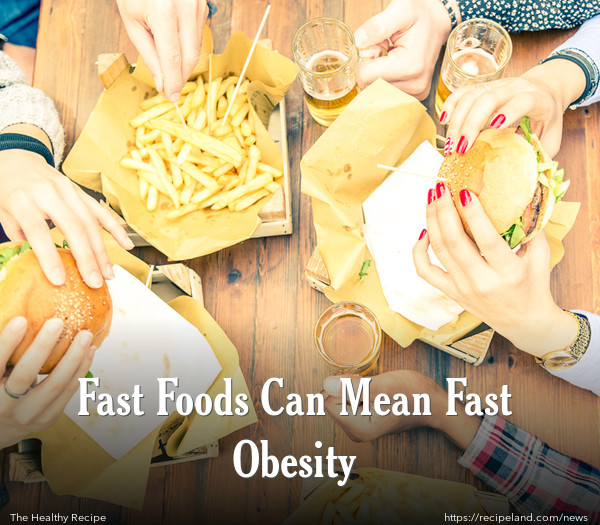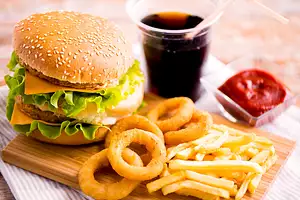Everyone has cravings for foods that are unhealthy from time to time, even those who are committed to a very healthy lifestyle and diet. Although the occasional indulgence is not going to cause you too much harm in the long run, understanding exactly what you are putting into your body and what the effects can be may help to curb some of those cravings and lessen the effects on your health.
Fast food, especially, is recognised to be a generally unhealthy choice when it comes to food options. Most fast food contains so many calories, so much fat and so much sodium that dieticians and nutritionists would all agree that eating too much fast food can put you well on your way to obesity, as well as a host of other diseases and health problems.
Recent studies in Singapore show that the population has become significantly more obese during the past decade, with the rates nearly doubling from around 6 percent to about 11 percent. This is an alarming increase, and something that should be addressed before it becomes even more of an epidemic.
Obesity is not the only problem associated with fast food. The increase in Type 2 diabetes is also striking. An obese body does not process foods as efficiently, and can become insulin resistant, causing diabetes.
Diet Closely Related to Obesity
The number one factor that is shown to be related to obesity is diet. Obviously, what you put into your body is important, few would argue with that. But, diet means more than just food, it also means eating habits. Behaviours such as eating in front of the television, grazing while working, overeating, and portion size will also have a huge effect on the development of obesity.
Certainly the problem is closely related to food choices as well. If you are grazing on healthy snacks while working, such as baby carrots with hummus, you are far less likely to develop problems with obesity than if you were munching on a bag of potato chips or putting away a few candy bars each day. Convenience foods are a serious contributor to the problem. Unfortunately, convenience foods are just that—convenient. They are often the easiest choice to grab when you need something to eat.
Convenience foods tend to be loaded with fat, calories, sodium and preservatives. These are not the things that you want to be big parts of your diet. In fact, you want to limit these things as much as you can if you are trying to adopt a healthy lifestyle. These ingredients are directly related to the development of obesity, as well as other health problems including high cholesterol, high blood pressure, heart disease, sleep apnea, joint pain, autoimmune problems and many other serious issues.
Reasons to Avoid Fast Foods
- Fast foods have a high glycemic index (GI): Foods with a high GI are digested quickly. They are rapidly converted to glucose, which is released into the bloodstream. When this occurs, insulin converts this glucose into energy that will sustain your body. Those who are insulin-resistant, or have Type 2 diabetes, will not be able to properly process the glucose, and it will remain in your bloodstream. When the glucose is not properly processed, organ damage can result.
- Fast foods are highly processed: Fast foods contain excessive amounts of sodium, trans fats, and saturated fats, all things that you want to avoid in a healthy diet. Just as an example, one juicy Big Mac meal can provide almost your entire daily maximum recommended amounts of sodium and saturated fats. Keep in mind that some recent studies have even shown that the meats in these meals are “not real meat” and highly processed, too. Because this is not the only thing you will eat that day, it is a very unhealthy choice for these reasons. Also, this kind of meal lacks a balance of nutrients that are required for keeping your body running well, and you will still be hungry for other foods to meet these needs. High levels of saturated fats or trans fats will raise your “bad cholesterol” (LDL), and lead to clogged arteries and more problems. Too much of this kind of food can lead to heart disease and strokes, in addition to obesity.
- Consistently make healthy choices: Avoiding fast foods is only one part of a healthy lifestyle. Choosing plenty of fruits, vegetables, whole grains and lean proteins will help to prevent problems with obesity.
- Eat slower: People who shovel their food in quickly are at a higher risk for obesity and other problems. Plus, they will tend to enjoy their foods less, and end up eating more to feel satisfied. Take small bites, chew thoroughly, and eat slowly. You will enjoy your food more and feel more satisfied. The brain takes about 20 minutes to realize that you are full. When you eat fast, you will be more likely to overeat and consume far more calories than you need, increasing the risk of obesity.
- Choose healthy snacks: Snacking is not bad! Well, as long as you tend to choose healthy snacks. Nuts, seeds, fruits, veggies and whole grain crackers all make for filling and healthy snacks, and can help to control hunger and cravings for fast food. Studies have shown that small, frequent meals and healthy snacks can help prevent obesity.
- Avoid sugary drinks: Soft drinks and fruit juices are loaded with tons of sugar. A can of soda can contain as much as 26 teaspoons of sugar! Choose water as your main drink instead of soft drinks and fruit juice. Flavouring your water with a little lemon juice can make for a nice treat, too!
Avoiding obesity is not impossible! Making healthy choices, and avoiding fast foods and convenience foods will go a long way toward a healthy diet and healthy lifestyle! Occasional indulgences are okay, as long as you stick to an overall healthy eating plan.
SOURCES: https://www.healthxchange.com.sg/healthyliving/FitnessandExercise/Pages/Exercises-You-Can-Do-in-the-Car.aspx;
https://www.wikihow.com/Exercise-Your-Abs-While-Sitting;
https://www.grandparents.com/health-and-wellbeing/exercise-and-de-stress/chair-exercises; Image courtesy of Grant Cochrane / FreeDigitalPhotos.net










Comments